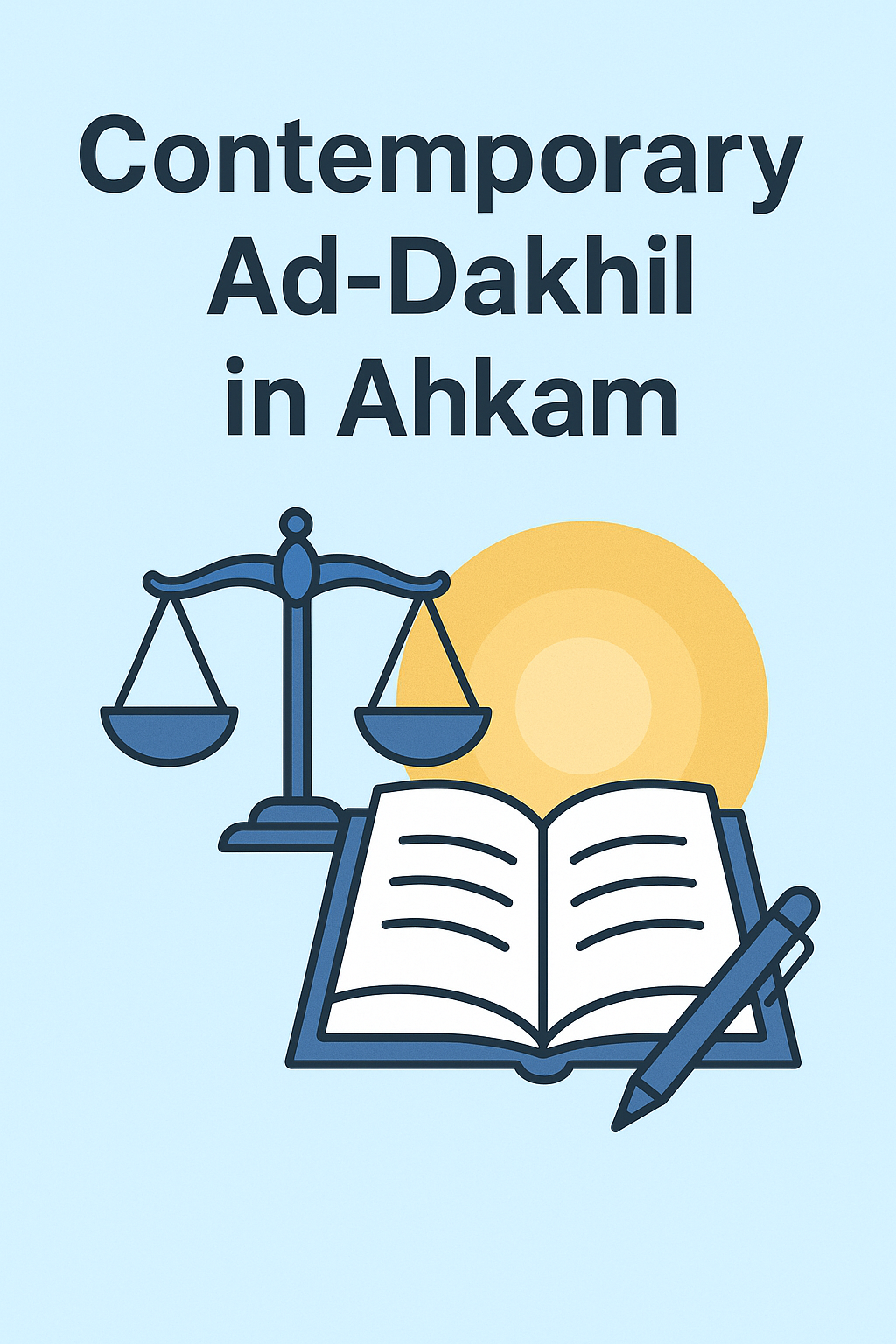Contemporary Ad-Dakhil in Ahkam Matters
Abstract
The phenomenon of Al-dakhil in the determination of Islamic law (ahkam) is a crucial issue that threatens the purity and objectivity of sharia, especially amidst the strong flow of external influences in the contemporary era. Al-dakhil refers to the entry of external elements such as local culture, political pressure, economic interests, and the dominance of digital media into the legal istinbat process without a valid basis in sharia. This study is motivated by concerns about the emergence of Islamic legal products that are more influenced by public opinion, power, or popular narratives than authoritative ushuliyah methodology. Using a qualitative approach through the method of library study and descriptive-analytical analysis, this study examines classical and contemporary literature in the field of ushul fiqh to identify the types of al-dakhil and their impact on the authenticity of Islamic law. The results of the study show that al-dakhil can appear in the form of cultural interventions that are contrary to sharia, adjustments to law for political interests, to fatwas born from social media pressure without going through a valid istinbat process. This condition not only has the potential to damage the integrity of Islamic law. Therefore, it is important to apply a systematic ushuliyah approach, by integrating the principles of maqāṣid al-syarī‘ah and maslahah in filtering external influences. In conclusion, filtering al-dakhil is an essential scientific and methodological step to keep Islamic law authentic, valid, and able to answer the needs of the times in a relevant manner.
References
Abdullah, M. Amin. "Pendekatan Sosio-Kultural dan Maqāṣid al-Syarī‘ah dalam Pembentukan Hukum Islam." Jurnal Kordinat 16, no. 1 (2017).
Ahimsa, Ratu Sheba Sofie dkk. "Prinsip dan Kaidah Hukum Islam sebagai Landasan Pengembangan Asuransi Syari’ah." Az- zarqa 5, no. 1 (2013): 4-5.
Al-Aziz, Ahmad Habiburramam. “Skripsi: Dialektika Tahapan Pengharaman Khamar Dalam Al-Qur’an: Telaah Dalam Kitab Tafsir At-Thabari,.” Mataram: jurusan Ilmu Al-quran dan Tafsir Fakultas Ushuluddin dan Studi Agama-agama Universitas Islam Mataram, Mei 2022. 46-47.
Al-Sheikh, Abdullah bin Muhammad Abdurrahman Bin Ishaq. Lubaabut Tafsiir Min Ibni Katsir {Tafsir Ibnu Katasir}. Dialihbahasakan oleh Abdul Gohaffar E. M. Bogor: Pustaka Imam asy-Syafi'i, 2004.
Asmarita, Desi. "Questioning the Validity of Hadith in the Digital Era." Living Hadis 6, no. 1 (2021): 2-3.
Azmina, Ulya. "Nisab Barang Curian yang Diancam Hukuman Potong Tangan dalam Perspektif Tafsir Al-Qurṭubī dan Ibn Kathīr." UIN Ar-Ranary, 2017: 17.
Falah, Syamsul dan Wasim, Arif Al. "Relasi Maqasid dengan Dalil-dalil Fiqih." Syariati: Jurnal Studi Al-Qur’an dan Hukum 8, no. 2 (2022): 97.
Fawaid, Imam. "Konsep Sadd al-Dzarî’ah dalam Perspektif Ibnu al-Qayyim al-Jauziyah." Lisan al-Hal: Jurnal pengembangan Pemikiran dan Kebudayaan 13, no. 2 (2019): 366.
Febriani, Anisa Rizki. Surat An Nur Ayat 31, Jelaskan Aurat yang Wajib Ditutup Wanita. Maret 14, 2023. https://www.detik.com/hikmah/khazanah/d-6619052/surat-an-nur-ayat-31-jelaskan-aurat-yang-wajib-ditutup-wanita (accessed April 27, 2025).
Hamka. Tafsir Al-Azhar. Singapura: Pustaka Nasional Pte Ltd Singapura, 1982.
Hasan, Hamsah dkk. "Pengaruh Sosial Politik Terhadap Pembentukan Hukum Islam." Kuriositas: Mdia Komunikasi Sosial dan Keagamaan 14, no. 2 (2021): 122-136.
KBBI. Kontemporer. n.d. https://kbbi.kemdikbud.go.id/entri/kontemporer (accessed April 27, 2025).
kemenkes, Redaksi. 5 Bahaya Narkoba bagi Kesehatan Mental yang Perlu Anda Ketahui. Januari 13, 2025. https://ayosehat.kemkes.go.id/bahaya-narkoba-bagi-kesehatan-mental (accessed April 27, 2025).
Komariah, Siti. Berjilbab Bukan Suatu Kewajiban, Benarkah? Januari 29, 2020. https://www.voa-islam.com/read/muslimah/2020/01/27/69448/berjilbab-bukan-suatu-kewajiban-benarkah/ (accessed April 27, 2025).
Komisi Fatwa Majelis Ulama Indonesia. Fatwa Nomor 24 tahun 2017 Tentang Hukum dan pedoman Bermuamalah Melalui Media Sosial. Jakarta: MUI, 2017.
Kudus, Redaksi IAIN. Narkoba Dalam Pandangan Tafsir Maqashidi (Sima Aulan Nisa’ Dwi Zakiyah Allayni). September 21, 2021. https://iqt.iainkudus.ac.id/berita-58013-NARKOBA-DALAM-PANDANGAN-TAFSIR-MAQASHIDI-(Sima-Aulan-Nisa%C3%A2%E2%82%AC%E2%84%A2-Dwi-Zakiyah-Allayni).html# (accessed April 27, 2025).
Nirwana, Andri dkk. "Kajian Kritik pada Bentuk dan Pengaruh Positif al-Dakhil." Al;Quds: Jurnal Studi Al-Quran dan Hadis 5, no. 2 (2021): 718-72.
Ramli. Ushul Fiqh. 1. Yogyakarta: Nuta Media, 2021.
Rusfi, Mohammad. "Maqasid Al-Syari’ah dalam Perspektif Al-Syatibi." Asas: Jurnal Hukum Ekonomi Syariah 10, no. 2 (2018): 9.
Safriadi. "Maqasid Al-Syari’ah sebaai Metode Ijtihad Kontemporer." Al-Qadha: Jurnal Hukum islam dan Perundang-undangan 4, no. 2 (2017): 14.
Septiasari, Isna. "Kritik Hermeneutika dALAM Menafsirkan Al-Quran Ditinjau dari Konsep Ad-Dakhil fi At-Tafsir." Jurnal: Al Muhafidz: Jurnal Ilmu Al-Qur'an dan Tafsir 1, no. 2 (2021): 171.
Shihab, M. Quraish. Tafsir Al-Misbah: Pesan, Kesan dan Keserasian Al-Quran. Jakarta: Lentera Hati, 2002.
Syasi, Mohamad dan Ruhimat, Li. Ashil dan Dakhil dalam Tafsir Bi al-Ma’tsur karya Imam al- Suyuthi. 1. Bandung: Prodi S2 Studi AGama-agama UIN Sunan Gunung Djati Bandung, 2020.
Yuhendrico, Deni dan Faizin. "Perubahan Sosial dan Hukum Islam." Istishab: Journal of Islamic Law 2, no. 1 (2021): 6-7.





